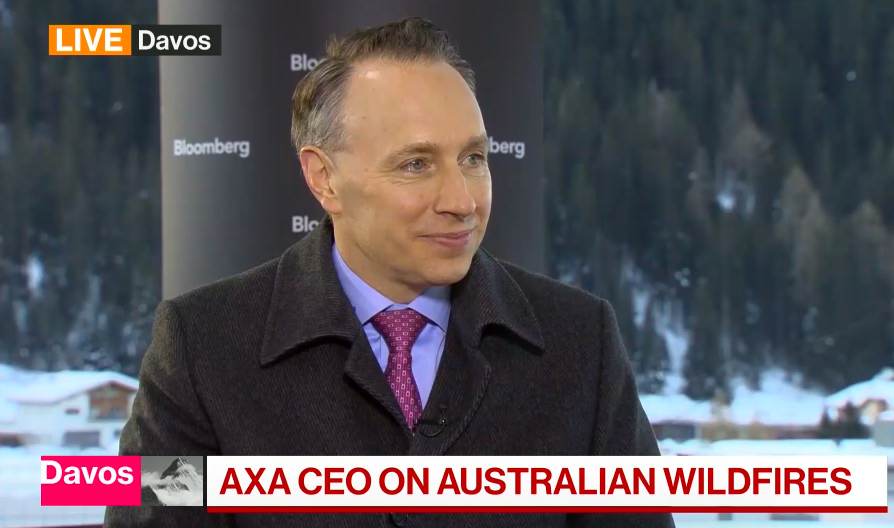For the insurance and reinsurance industry climate change is a common factor that is seen to affect the rate of catastrophe losses and also the incidence of virus outbreaks, AXA Group CEO Thomas Buberl explained.
 While trends remain uncertain, when it comes to the impact of climate change on the occurrence of catastrophe and severe weather events, Buberl believes it is already pushing insurers to increase prices.
While trends remain uncertain, when it comes to the impact of climate change on the occurrence of catastrophe and severe weather events, Buberl believes it is already pushing insurers to increase prices.
On viruses and pandemics, such as the ongoing coronavirus outbreak, Buberl believes that climate change and warming are factors affecting the incidence of such events as well.
Speaking to Bloomberg TV in an interview at the World Economic Forum (WEF) 2020 annual meeting in Davos, the AXA CEO explained how climate change is a growing concern.
On the subject of the coronavirus outbreak that began in China, he said, “I guess this is the new norm, because we see more viruses popping up particularly due to climate change because viruses do travel.
“When you look at the response in Wuhan, and beyond Wuhan, I think it was very professional and detected very early on.
“We were involved through AXA Partners a lot and it was a good chance to show our customers that we are there and we can help in an abnormal situation.”
Buberl said that it is vital to learn from these outbreaks to ensure preparation for the next, as there is every chance they increase in frequency.
“We always learn in these emergency situations but then forget again when it’s gone. We need to remind ourselves that the environment is changing, it is getting warmer everywhere and therefore new viruses will pop up.
“Going forwards the implication of climate on health is something we need to study more and need to understand better,” Buberl stated.
On catastrophes and severe weather events, an area AXA is now much more exposed to since its strategic shift towards more specialty lines underwriting with the acquisition of XL, Buberl believes climate change is a factor.
Although the exact relationship between it and rising frequency of events or losses is harder to pin down still.
He explains, “It is absolutely true that you see more natural catastrophes but the pattern is not 100% clear yet.
“If you go back to last year you see there were many more small ones, if you go back further you see that there were very few big ones. So the patterns are not yet clear. But one thing is clear, we have more of them.
“The insurance industry is obviously looking at this because it is a bigger burden in terms of loss.”
Buberl also noted the importance of a shift in strategy, when it comes to insurance and reinsurance, to do more than just sell policies and indemnifying customers against loss. Encouraging resilience building and other protection related initiatives to help customers manage their risk and exposure better.
He said, “We try to help our customers to do more on prevention and be better insured, but if you look at it globally you see the majority of these catastrophes are not even insured.
“$130bn is the protection gap of people suffering from not being insured and that’s a real problem.
“The only way we can continue to insure even more people, also to cover the protection gap, we need to work more on prevention.”
The increase in catastrophes and related losses is having an impact on pricing, Buberl explained, even if the trends and relation to climate change are still hard to see.
“In insurance there is a principle. There is never a bad risk, only a bad price,” he continued.
Adding, “Every risk is insurable, but when you look at what is happening around the environment it will mean that prices are increasing.”
Which brings the conversation back to protection and resilience again, as Buberl said, “We are helping our customers, companies and individual customers, to be better protected. That is the only way we can continue to afford insurance.”


